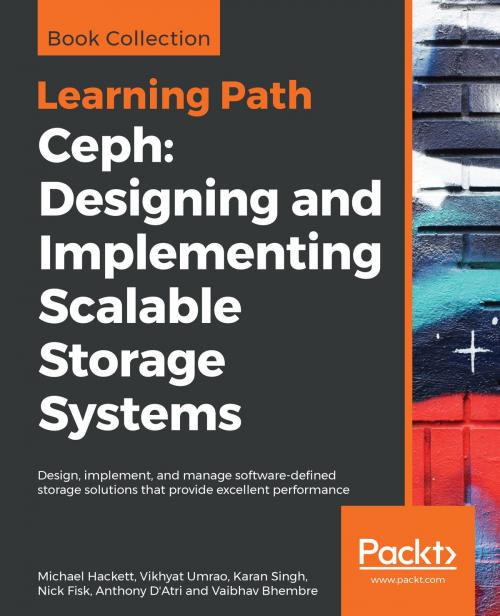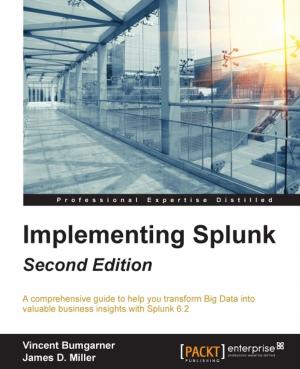Ceph: Designing and Implementing Scalable Storage Systems
Design, implement, and manage software-defined storage solutions that provide excellent performance
Nonfiction, Computers, Database Management, Information Storage & Retrievel, Operating Systems, General Computing| Author: | Michael Hackett, Vikhyat Umrao, Karan Singh, Nick Fisk, Anthony D'Atri, Vaibhav Bhembre | ISBN: | 9781788298803 |
| Publisher: | Packt Publishing | Publication: | January 31, 2019 |
| Imprint: | Packt Publishing | Language: | English |
| Author: | Michael Hackett, Vikhyat Umrao, Karan Singh, Nick Fisk, Anthony D'Atri, Vaibhav Bhembre |
| ISBN: | 9781788298803 |
| Publisher: | Packt Publishing |
| Publication: | January 31, 2019 |
| Imprint: | Packt Publishing |
| Language: | English |
Get to grips with the unified, highly scalable distributed storage system and learn how to design and implement it.
Key Features
- Explore Ceph's architecture in detail
- Implement a Ceph cluster successfully and gain deep insights into its best practices
- Leverage the advanced features of Ceph, including erasure coding, tiering, and BlueStore
Book Description
This Learning Path takes you through the basics of Ceph all the way to gaining in-depth understanding of its advanced features. You’ll gather skills to plan, deploy, and manage your Ceph cluster. After an introduction to the Ceph architecture and its core projects, you’ll be able to set up a Ceph cluster and learn how to monitor its health, improve its performance, and troubleshoot any issues. By following the step-by-step approach of this Learning Path, you’ll learn how Ceph integrates with OpenStack, Glance, Manila, Swift, and Cinder. With knowledge of federated architecture and CephFS, you’ll use Calamari and VSM to monitor the Ceph environment. In the upcoming chapters, you’ll study the key areas of Ceph, including BlueStore, erasure coding, and cache tiering. More specifically, you’ll discover what they can do for your storage system. In the concluding chapters, you will develop applications that use Librados and distributed computations with shared object classes, and see how Ceph and its supporting infrastructure can be optimized.
By the end of this Learning Path, you'll have the practical knowledge of operating Ceph in a production environment.
This Learning Path includes content from the following Packt products:
- Ceph Cookbook by Michael Hackett, Vikhyat Umrao and Karan Singh
- Mastering Ceph by Nick Fisk
- Learning Ceph, Second Edition by Anthony D'Atri, Vaibhav Bhembre and Karan Singh
What you will learn
- Understand the benefits of using Ceph as a storage solution
- Combine Ceph with OpenStack, Cinder, Glance, and Nova components
- Set up a test cluster with Ansible and virtual machine with VirtualBox
- Develop solutions with Librados and shared object classes
- Configure BlueStore and see its interaction with other configurations
- Tune, monitor, and recover storage systems effectively
- Build an erasure-coded pool by selecting intelligent parameters
Who this book is for
If you are a developer, system administrator, storage professional, or cloud engineer who wants to understand how to deploy a Ceph cluster, this Learning Path is ideal for you. It will help you discover ways in which Ceph features can solve your data storage problems. Basic knowledge of storage systems and GNU/Linux will be beneficial.
Get to grips with the unified, highly scalable distributed storage system and learn how to design and implement it.
Key Features
- Explore Ceph's architecture in detail
- Implement a Ceph cluster successfully and gain deep insights into its best practices
- Leverage the advanced features of Ceph, including erasure coding, tiering, and BlueStore
Book Description
This Learning Path takes you through the basics of Ceph all the way to gaining in-depth understanding of its advanced features. You’ll gather skills to plan, deploy, and manage your Ceph cluster. After an introduction to the Ceph architecture and its core projects, you’ll be able to set up a Ceph cluster and learn how to monitor its health, improve its performance, and troubleshoot any issues. By following the step-by-step approach of this Learning Path, you’ll learn how Ceph integrates with OpenStack, Glance, Manila, Swift, and Cinder. With knowledge of federated architecture and CephFS, you’ll use Calamari and VSM to monitor the Ceph environment. In the upcoming chapters, you’ll study the key areas of Ceph, including BlueStore, erasure coding, and cache tiering. More specifically, you’ll discover what they can do for your storage system. In the concluding chapters, you will develop applications that use Librados and distributed computations with shared object classes, and see how Ceph and its supporting infrastructure can be optimized.
By the end of this Learning Path, you'll have the practical knowledge of operating Ceph in a production environment.
This Learning Path includes content from the following Packt products:
- Ceph Cookbook by Michael Hackett, Vikhyat Umrao and Karan Singh
- Mastering Ceph by Nick Fisk
- Learning Ceph, Second Edition by Anthony D'Atri, Vaibhav Bhembre and Karan Singh
What you will learn
- Understand the benefits of using Ceph as a storage solution
- Combine Ceph with OpenStack, Cinder, Glance, and Nova components
- Set up a test cluster with Ansible and virtual machine with VirtualBox
- Develop solutions with Librados and shared object classes
- Configure BlueStore and see its interaction with other configurations
- Tune, monitor, and recover storage systems effectively
- Build an erasure-coded pool by selecting intelligent parameters
Who this book is for
If you are a developer, system administrator, storage professional, or cloud engineer who wants to understand how to deploy a Ceph cluster, this Learning Path is ideal for you. It will help you discover ways in which Ceph features can solve your data storage problems. Basic knowledge of storage systems and GNU/Linux will be beneficial.















